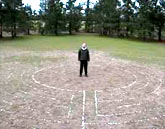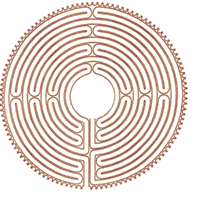
Several members walking the original labyrinth path for the first time. It only took 8 people about three hours to complete. It looked great and lasted quite some time. It was made with marble chips spaced 4 inches apart.

Our labyrinth is made of natural stone and by its nature is
not completely even or level, nor is the rock laid in such a way that
one might not ever stumble. We urge you to use caution, to walk
noticing your step, with eyes wide open. Feel free to keep the
labyrinth clean, to groom it as you walk. After a rain the rock may be
slippery, so use caution and please move slowly. Some people may want
to walk with their bare feet; in such a case, the need for greater care
and caution is increased.

this is how the labyrinth looks today: 44,000 pounds of flagstone, 63'
wide.
a few
ideas
Some people pray, while others clear their heads by the practice of
walking. Your walking experience may be similar to that of your life
with moments of joy and contemplation, certainty of direction and
confusion, facing one way and then the next, moving in and in the next
moment exactly opposite and moving out. As we move along the path we
might reflect on our actions now and remember previous similar steps we
walked. Perhaps you will recall a walk made earlier in your life with a
loved one or special friend, or recall a walk in a moment of crisis or
ecstasy, or walking as a way to get home, or to work, or school. You
may recall walking a long distance in a city or on the beach. Your
experience of years ago can echo something important as you walk and
think about your life today.
As you approach the labyrinth, consider what you are about to do. Many people have stood in your shoes on the brink of an experience with the labyrinth. Maybe at first one could just begin by walking around the disk and contemplating what you’re about to do. You'll notice that there is an obvious entrance, a path leading in. Fell free to enter that way or begin anyway you see fit. You can walk right into the center and enjoy that experience of being in the middle of this disk of stone and lines. From this center you can work your way out by following the pathway to the exit. Or you can begin by stepping in and walking complete circles and gradually advancing in to the next levels. Of course, one can begin at the entrance and follow the prescribed path as it weaves all away to the center.
Along the way you may rest, or push ahead and make it all the way through without stopping. If you’re distracted or need to rest, should you get mixed up, or somehow miss a turn, it doesn’t matter --you can pick up where you are. In this case the labyrinth can help you contemplate the experience in life of sometimes being mixed up.As you walk consider how you are being swept along all in the stream of life and how your walking can be almost automatic and without resistance, going with the flow.
This country setting presents you with a chance to hear and smell things that you may not usually find at home or at work. You may hear people at work or at play. There may be sounds of animals like cattle and chickens. Insects may buzz or whirl about you. While privately walking the labyrinth we’re reminded of the other people and creatures that share this world and our life. As walkers we may consider how all our steps impact lives of the people and the creatures around us.
Sometimes we come to the labyrinth with things that need to be left behind. As you step into the labyrinth you can visualize what it is that needs to go. Along the way, systematically, with intention, you can let this thing go so that as you make it to the middle, to the center, it is no longer with you on the journey. You have released it and simultaneously been released from it. As you exit the labyrinth is gone --it is no longer a part of your life. You are free person. Some may think of this as forgiveness and others as confession. Recognize what needs to be sacrificed or abandoned and deliver it up to God.
Some will come to the labyrinth seeking the answer to prayer. Maybe healing is requested. Perhaps a challenging problem needs to be addressed. Use this space and this time, the turns and curves, the exits, and the center to repeat your requests and to listen for an answer. Maybe in the total experience you’ll find what you seek.
We are just scratching the surface on the wealth of wisdom and experience you will find at and in the labyrinth. Check out the links for more ideas.
our beginning
Mill Creek Christian Church began the labyrinth experience with a temporary white rock on grass outline. Several members met one afternoon and crawling around the grass, scribed the lines and turns in just a few hours. The original was the identical size and in the exact same location as the finished stone labyrinth you will find today. After a period of experience and discussion it was decided to complete the project with a permanent installation. Various materials were explored and considered before settling on flagstone. Sod was removed and transplanted and the large circle was prepared with a sand and gravel base. The stone arrived on ten 2 ton palettes (actually 44,000 pounds of stone). The ten palettes were divided to make twenty, approximately 1 ton palettes, and then these were deposited on the grass around the vacant circle.
One Saturday morning in 2003 a couple dozen members met and after scribing the lines with a giant truss, and marking all the turns in just about an hour, we began the process of laying stone. Like making a big jigsaw puzzle, each person simply took one stone from the top of the stack, examined it for characteristics and possible placement, and just went and found a place where it best fit in the scheme of things. Basically, in about 9 hours, (over two Saturdays) the general labyrinth was finished --you could walk it! Many hours were spent thereafter shaping stone, refitting, and refining the paths and turns. What you will experience at MCCC is the work of the people of the church; no professional masons were involved. This is truly a labor of love.The
Labyrinth Society
http://www.labyrinthsociety.org
Grace
Cathedral / San Francisco
http://www.gracecathedral.org/labyrinth/
The Labyrinth at
Mill Creek Christian Church
was made possible by the vision
and labor of members; and with generous financial gifts made in memory
of loved ones.
What is a LABYRINTH?
Labyrinths can be found throughout the world --from France to Peru and
from Egypt to Sweden. They are made of stone, rocks, shells, wood,
earth, grass, hedges.
Labyrinths have been with us for five millennia or more and have been
used for calming, spiritual exercise, meditation, prayer, and religious
rituals.
The labyrinth is unicursal, that is, of
one path. It is not a maze. Many use the names
“maze” and “labyrinth” as if
they are interchangeable, but a maze contains misleading pathways,
false turns, and dead ends. Since the labyrinth has one continuous path
all the way to the inside disk it is much different from a confusing
maze.
In the labyrinth there are no dead ends and no false turns. While it
may be amazing to some it is not a maze. The labyrinth journey leads in
and out and in all directions. Getting to the center is full of twists
and turns but you can’t get lost. You might, however, be
found.
The Mill Creek Church Labyrinth has a distinctive cruciform shape made
by four equal divisions. It has: 12 concentric circles, 11 circuits,
and 34 turns, all leading to an expansive center disk. The path is
about 1600 linear feet long (just under a third of a mile).
Our labyrinth is based on the famous Cathedral of Chartres Labyrinth which has an additional six petal division in the center and a perimeter line of 113 lunettes or lunations (a lunar calendar of sorts), essential in calculating the date of Easter.

Shannon Moore in the center, after laying our prototype path with
marble chips back in 1999
The MCCC labyrinth is larger than most you will find that are based on the Chartres design. Ours accommodates a 24 inch pathway instead of an 18 inch path in a 63 foot diameter disk (Chartre is 42') making for a much more roomy space, which is very nice when there are many people on the labyrinth.
Tennessee Blue
Flagstone is the basic material and all 22 tons were set by the members
of the Mill Creek Christian Church over an extended period.
The
Mill Creek Church labyrinth
is presented In memory of
Dwight Johnson
by the Johnson Family
Killed Serving Our Country
in Viet Nam in 1968
at the age of 20
And in Memory of
H. Mack Britt
by the Britt Family
Margaret and Bill Tracy
by Antoinette Anglin
Wade Grice
by Mill Creek Church
Pauline Davis
by Libby Yelverton
Vara Lee Rose
by Jack Rose
D. C. and Carrie Lee Shaw
by Barbara Shaw
Naomi Langston
by Steve Langston
With
love and thanksgiving
this memorial labyrinth is presented
to the community for shared worship and
prayer --with the hope that it will serve
all people, and inspire those of faith
for many years to come.
